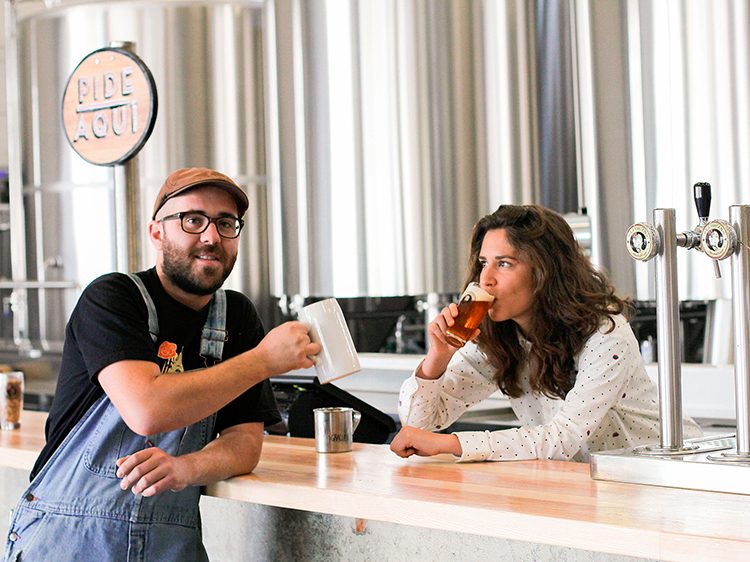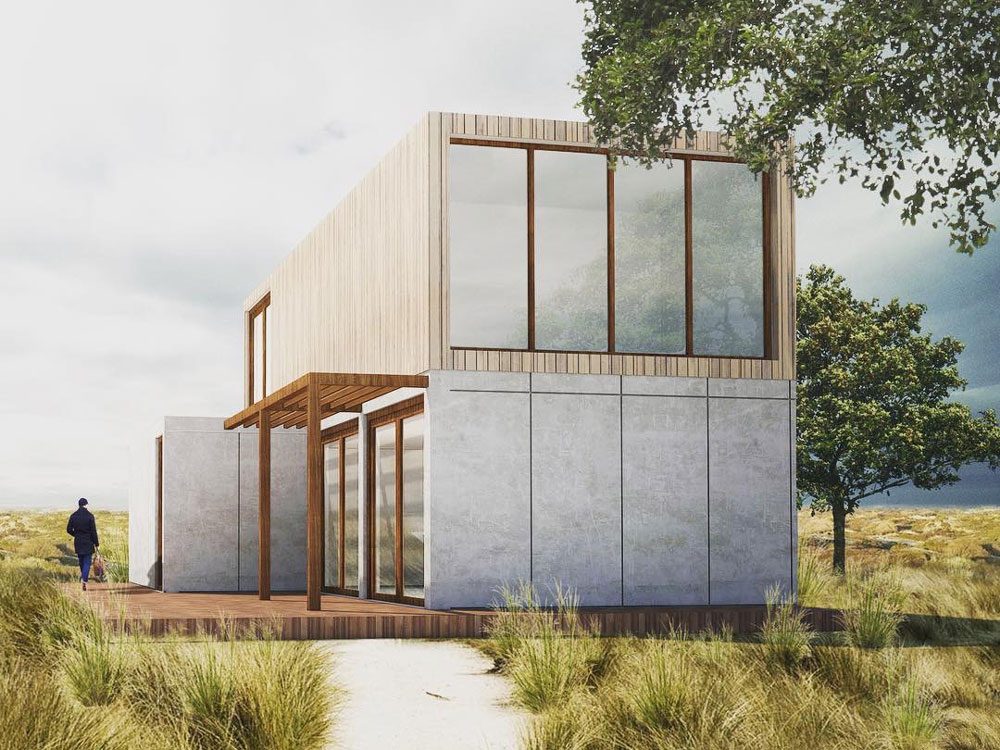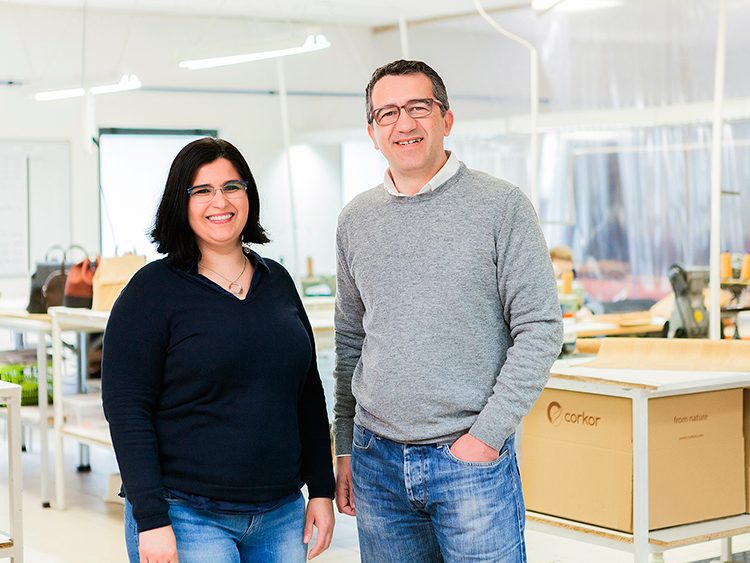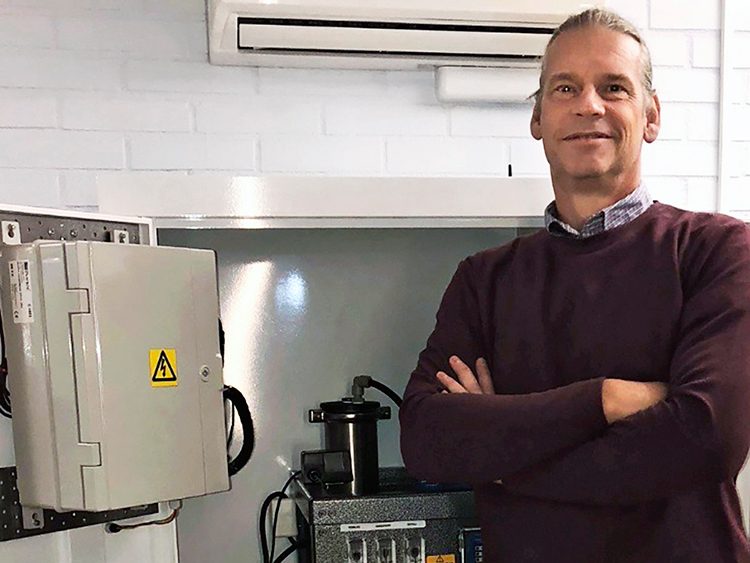
The Craft Brewer
Jaime Riesgo, 32, started the craft brewery Cervezas la Virgen in his home town of Madrid in 2011 with his girlfriend Ana, now his wife, and a friend.
I was working in San Francisco as an account manager for an advertising company, but one day I decided it was not my dream job. Ana and I had fallen in love with craft beers in California and with the people who produced them. We even brewed our own beer at home.
We came back to Spain in 2010 when no one was making craft beer in Madrid and there was a financial crisis. I tried to get a 250,000-euro bank loan to open a brewery. The adviser told us, “You are crazy—forget it!” So I went to a small bank where my father and I were customers and they lent us money with our houses as security.
This enabled us to open a small, 1,000-litre brewery with a tap room in 2011. It was in an alley in front of a paint shop in an industrial area an hour from the city—not a very promising location!
We sold to friends and neighbours. Word got around that the beer was good and people started coming from Madrid. We worked long hours, brewing in the mornings and opening the tap room at night.
In 2015, we realized we needed a bigger space, and moved 200 metres down the road to a brewhouse capable of a million litres a year. All our employees, family and friends came to the opening. It was such a pleasure to serve beer to clients who had been with us since the beginning.
We built the company from zero and could choose our values—producing quality beer, encouraging a love for beer but not crazy drinking, and respect for the natural environment and local community. For example, we have a silo for the spent grains used in the brewing process which we give to local farmers for their fields.
We brew around 14 beers a year which we sell to local bars and restaurants in Madrid and will soon be introducing our beer into the United Kingdom and France. Although we have won best lager in Spain for our Madrid Lager and a gold medal for our wheat beer, the business hasn’t changed. The ingredients and the process are the same. There are no additives. Just good beer.
Check out these six brilliant business tips from one of Canada’s top entrepreneurs.

The Green Homes Designer
In 2014 Gert van Vugt, 29, co-founded Sustainer Homes in Utrecht, Netherlands. The company builds wooden sustainable houses based on an innovative modular system.
We aim to reduce CO2 emissions in the building industry. Our architects help clients realise their dream house very quickly using a building system based on new design and production technologies. A home takes carpenters a month to construct in the factory, one or two days to assemble on site and two weeks to paint and finish. Our homes emit 90 per cent less CO2 than traditional homes and cost less to build and run.
I’ve got a master’s degree in social science, but I wanted to make an impact in the field of sustainability. My first business after graduating was a solar panel installation company with my friend Wolf. It was when we were hanging from roofs with climbing gear that I realized that even new homes were built in a very traditional way. Slapping solar panels and heat pumps on an inefficient house is not going to make it more sustainable.
From one day to the next we shut down the solar panel website to put all our energy into Sustainer Homes. In March 2015, we got onto a business accelerator programme, which gave us office space, training and a 15,000-euro cash injection in return for shares in the business. And that year we also won the ASN Bank World Prize for a sustainable energy start-up, worth 10,000 euros.
I’m CEO but four of us, all friends, started the business. We shared the same conviction. You don’t get many opportunities where you can make so much impact. It was like there was no fruit hanging anywhere else so low ever! And it still feels like that.
Within two years 20 people were working at Sustainer. In 2016 we built our first house. The first time it went on top of a truck was scary. If the expensive windows had shattered, that would have meant the end of the company. But they didn’t and seeing the 1.5-tonne structure the four of us had conceived floating through the air and landing successfully on the foundations was a majestic feeling!
Last year we had nearly 50 homes under construction, including two developments of 11 and 16 houses. And we’re planning to expand to other countries, starting with Germany.
It’s been an intense experience, but I wouldn’t trade it for the world.
These 13 tips can help you save money and lead a more eco-friendly lifestyle.

The Etsy Entrepreneurs
Natália Guerreiro, 41, and her partner Vítor Lopes founded Portuguese company Corkor, which creates handbags and other accessories from cork, in 2011. They began their global business by selling on Etsy, the e-commerce website for handmade and vintage items.
Vítor and I lived in England for seven years, where we’d already been buying and selling online.
When we came back to Lisbon in 2008 with our two-year-old son, the economic crisis was just starting. What could we do which would be good for us, help our country and be unique? Portugal is famous for its cork oak forests and we associated cork with our childhood, happiness, love and nature. And I like to work with my hands. That’s how we came up with the idea of handcrafting pieces from cork instead of leather.
We started working from our 20-square-metre windowless garage with our son lying on a bed nearby. We would work all night if necessary, making mobile phone cases and jewellery. We invested our savings from the sale of our house in the UK, and didn’t pay ourselves any wages for two years. We started selling our goods on Etsy in 2012 as well as through our website.
Etsy was very helpful. It kept us close to our customers and we learned a lot from its forum and tutorials. But it’s no longer our first market. We sell on the internet and through distributors who approach us. We had a turnover of 5,000 euros in our first year; in 2017 it was more than 600,000 euros.
There are now 12 of us working in a 320-square-metre factory and we’re like a family. It takes a year to learn how to make a bag or wallet, so I prefer to keep the same team and say no to a big order than say yes and fall down, or hire temporary staff. But it can be frustrating at Christmas when we have to remove items from the website because we can’t make enough.
We use the highest grade cork and do everything ourselves—designing, researching, testing, producing and marketing.
It meant a lot to win an award from animal rights charity PETA in Germany in 2015 for the best handbag for men and to become vegan-certified in Germany and the UK.
Our plans are to move to an even bigger space, continue to listen to our customers, grow with them, and produce great quality fashionable products.
The world’s richest man just revealed one of his secrets to success.

The Cheese Maker
Razan Alsous, 35, from Syria, has built up a thriving halloumi cheese business in her adopted Yorkshire, England, taking advantage of a gap in the market and the delicious local milk.
I came to the UK with my husband Raghid and three children in July 2012. In Damascus where we lived there were fewer and fewer essentials, including nappies, electricity and water. After an explosion at Raghid’s office we came to the hard decision that it was time to leave Syria for the safety of our family.
We had visas allowing us to travel to the UK so we came to Huddersfield in Yorkshire as we already had family over there. After we had settled and I was granted residency, I searched for a job for a year without success, so I started to think about self-employment.
I couldn’t find good halloumi cheese, but at the same time we found the milk wonderful, so I thought, Why not make our own cheese?
We got a £2,500 start-up loan and mentor support from the Government’s Enterprise Agency. At the same time my brother-in-law’s fried chicken shop was closing. We moved in there and bought kitchen equipment that we modified to make halloumi—for example, an ice-cream maker to heat milk.
Four days after starting Yorkshire Dama Cheese in June 2014—just my husband, my brother and me—we risked our last £700 on a stand at the Harrogate Fine Food Show to introduce our cheese to the British food industry. We realized we had to prove the quality, so we entered the World Cheese Awards after four months and won Bronze. Yes, I thought, we can do it!
We have now won 18 awards in four years and employ six people. We moved to bigger premises in January 2017, which the Princess Royal opened. That meant a lot.
Our cheese is now officially branded as Yorkshire Squeaky Cheese, and we produce five varieties. Production is expanding month on month to keep up with demand. We have a wide customer base all over the UK, from local delis, farm shops and restaurants to wholesale distributors.
We’re now hoping to sell abroad, and I’ve been working on a book telling the story of my business with recipes.
I didn’t study business but I realize it’s in my personality and it is something I really enjoy.
Female CEOs share the best career advice they’ve ever received.

The Laundry Man
Fifty-four-year-old Per Hansson’s Swedish family business SWATAB has developed a unique chemical-free laundry system.
It all started because we have detergent allergies in the family. In the summer of 2013, I was working with my wife Katarina in her painting business where we cleaned façades with a de-ionised water system. It took off soot, grease, mould. I had a eureka moment at dinner one day: “If we could make a better system, and use it for washing machines, you should be able to do your laundry without detergents or softeners.”
I was a foreman on building sites but I’ve always been interested in chemistry and technology. I took the façade washing system to bits and built my own.
The DIRO filter system takes the salts and impurities out of tap water. This ultra-pure de-ionised water is slightly unbalanced, and to become balanced again it attaches to dirt.
When we had it tested according to EU-Ecolabel standards, the tester’s jaw dropped. “This is the first time in 25 years I’ve seen a totally chemical-free system that actually works,” she said.
I got a European patent in 2016 and we have installed DIRO in Swedish housing complexes with communal laundries, hotels, care homes and even a fire department. The 120cm x 80cm system sits between the water system and washing machine, but we also have a working 50cm x 50cm consumer prototype.
DIRO is already made under licence in the UK. When this is scaled up and moves into other countries, it will make a difference. It saves the environment, health, energy and money.
There were difficult times early on. We recruited three board members who didn’t want us to go to market. We couldn’t even send emails before they had seen them. We ended up having a disagreement and they resigned. And the first installation in a laundry in Gothenburg caused a major leak.
But the good moments have made up for it—for example, being one of six companies in the world to receive the WWF Climate Solver Award in 2017.
Five of us, all family, have been working from home in Everöd, in the countryside, but thanks to a new long-term investor we have moved to the city of Malmö, where we will take on more staff.
We aim high: we want to save the planet!
Next, check out these business tips from the cast of Dragons’ Den!